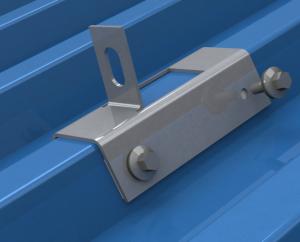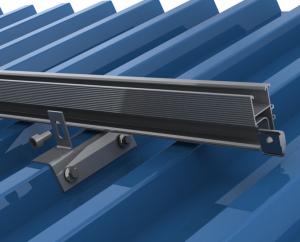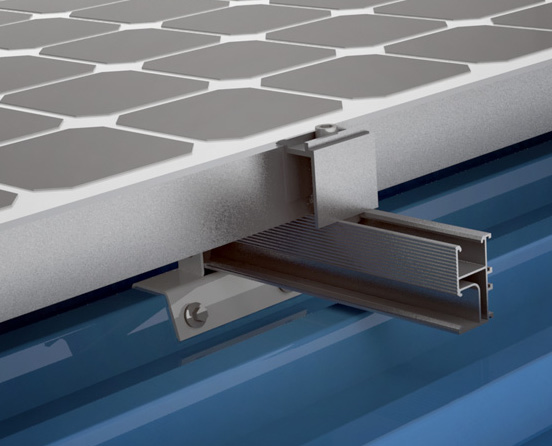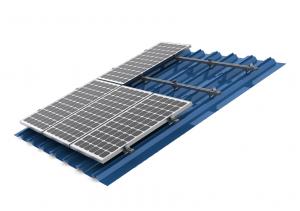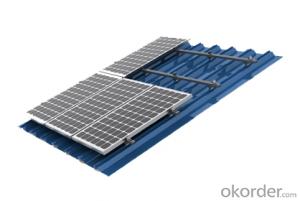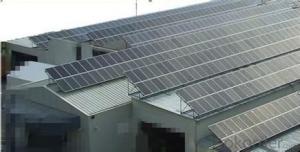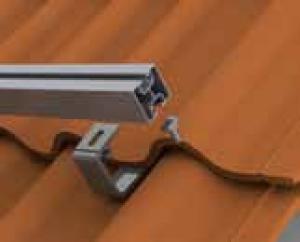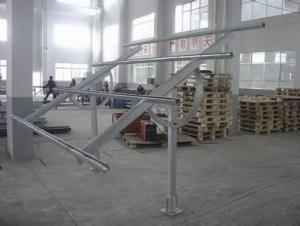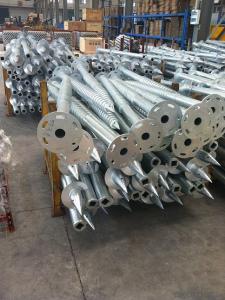Solar Energy Systems Swarthmore - Solar Mounting Metal Sheet Roof System
- Loading Port:
- China Main Port
- Payment Terms:
- TT OR LC
- Min Order Qty:
- -
- Supply Capability:
- -
OKorder Service Pledge
OKorder Financial Service
You Might Also Like
Product Features
• Less piece of components and easy for installation.
• Design speical clamp matching to the metal sheet shape and specification.
• Use super quality Al-alloy and stainless steel for components.
• Wide range of product line .
Technical Data
Installation site Metal sheet roof
Slope of roof Client requirement
Module specification Frame / frameless module, crystalline/thin film module
Installation type Parallel to the roof
Module arrangement Portrait Landscape
Module area square Client requirement
Module area position Client requirement
Roof structure Client requirement
Loading section Al 6063 T5
Small pieces Stainless steel, Al6063 T5
- Q: Can solar energy systems be used for commercial buildings?
- Yes, solar energy systems can be used for commercial buildings. Many businesses are increasingly adopting solar energy as a viable and sustainable source of power. Commercial buildings can install solar panels on rooftops or in open spaces to generate electricity, reduce energy costs, and lower carbon emissions. Additionally, government incentives and tax credits have made it financially attractive for businesses to invest in solar energy systems.
- Q: Are there any limitations to the lifespan of solar energy systems?
- Yes, there are limitations to the lifespan of solar energy systems. The most significant limitation is the degradation of the solar panels over time. Solar panels are made up of photovoltaic (PV) cells that convert sunlight into electricity. These cells degrade gradually, losing efficiency as they age. On average, solar panels experience a degradation rate of around 0.5-1% per year, which means that after 25-30 years, the panels might only produce around 75-80% of their original power output. Another limitation is the lifespan of other components in the solar energy system, such as inverters, batteries (if present), and wiring. Inverters, which convert the DC electricity generated by the solar panels into AC electricity for use in homes or businesses, typically have a lifespan of 10-15 years. Batteries, if used for energy storage, also have a limited lifespan, usually around 5-10 years. Wiring can deteriorate over time due to exposure to the elements, requiring maintenance or replacement. Furthermore, environmental factors can impact the lifespan of solar energy systems. Extreme weather conditions like hailstorms, hurricanes, or heavy snow can damage solar panels, reducing their efficiency or even rendering them inoperable. Additionally, excessive heat can accelerate the degradation of solar panels, shortening their lifespan. However, it is important to note that while solar energy systems have limitations, proper maintenance and regular inspections can help maximize their lifespan and performance. Many solar panels come with warranties that guarantee their performance for a certain number of years, often ranging from 20 to 25 years. Moreover, technological advancements and improvements in manufacturing processes are constantly being made, which may lead to longer-lasting and more efficient solar energy systems in the future.
- Q: Are solar panels weather resistant?
- Yes, solar panels are weather resistant. They are designed to withstand various weather conditions, including rain, snow, hail, and high winds. The materials used in their construction are durable and can handle exposure to the elements for many years. Additionally, solar panels are often installed at an angle to allow for self-cleaning and minimize the accumulation of dirt and debris, further enhancing their weather resistance.
- Q: Can solar energy systems be installed on rooftops?
- Yes, solar energy systems can be installed on rooftops. In fact, rooftops are one of the most common and convenient locations for installing solar panels as they receive direct sunlight and offer ample space for the panels. This placement maximizes the system's efficiency and allows homeowners and businesses to generate their own clean, renewable energy.
- Q: How does the efficiency of solar panels affect the performance of a solar energy system?
- The overall performance of a solar energy system is heavily influenced by the efficiency of solar panels. Panels with higher efficiency can convert more sunlight into electricity, resulting in greater energy production. This means that a solar energy system equipped with efficient panels can generate more power and meet a larger portion of the electricity demand. One of the main advantages of using highly efficient solar panels is that it allows for a smaller system size. Since each panel produces more electricity per unit of area, fewer panels are required to achieve the desired energy output. This not only saves installation space but also reduces the overall cost of the system. Additionally, a smaller system size means less maintenance and fewer potential points of failure, which improves the reliability and lifespan of the solar energy system. Furthermore, the efficiency of solar panels directly impacts the economic feasibility of a solar energy system. More efficient panels generate more electricity, which can offset a greater portion of energy consumption, leading to reduced utility bills. In some cases, excess electricity can be sent back to the grid, enabling net metering or even earning credits, further enhancing the financial benefits. A highly efficient solar energy system can also offer a quicker return on investment, making it a more appealing option for homeowners and businesses. Moreover, the efficiency of solar panels has a significant environmental impact. By converting more sunlight into electricity, highly efficient panels can reduce reliance on fossil fuel-based power generation, resulting in lower greenhouse gas emissions. This contributes to a cleaner and more sustainable energy future. The environmental benefits of efficient panels are crucial in the fight against climate change and the reduction of the ecological footprint associated with energy consumption. In summary, the efficiency of solar panels has a direct influence on the performance of a solar energy system. More efficient panels lead to increased energy production, smaller system sizes, reduced costs, and improved financial returns. Furthermore, they contribute to a more sustainable future by reducing reliance on fossil fuels and decreasing greenhouse gas emissions. Therefore, investing in highly efficient solar panels is essential for maximizing the effectiveness and benefits of a solar energy system.
- Q: Can a solar energy system be integrated with other renewable energy sources?
- Yes, a solar energy system can be integrated with other renewable energy sources. In fact, combining multiple renewable energy sources can have several benefits. By integrating solar energy with other renewables such as wind, hydro, or geothermal, we can create a more reliable and sustainable energy system. One advantage of integrating solar energy with other renewables is the ability to generate electricity consistently. Solar energy production is dependent on sunlight, which can fluctuate throughout the day and seasonally. By combining solar power with other renewables that have different production patterns, we can ensure a more constant and reliable energy supply. Additionally, integrating multiple renewable energy sources can enhance the overall efficiency of the system. Different renewable sources have varying strengths and weaknesses. For example, wind energy production is highest during the night when solar energy is not available. By combining these two sources, we can maximize the utilization of available resources and minimize waste. Furthermore, integrating solar energy with other renewables can help overcome geographical limitations. Certain regions may have excellent solar resources but limited wind or hydro potential. By combining different renewables, we can tap into the strengths of each source and create a more balanced and diverse energy portfolio. Finally, integrating multiple renewables can contribute to a more sustainable and resilient energy system. As renewable energy technologies continue to advance, we can harness the benefits of each source while minimizing the environmental impact. By diversifying our energy sources, we can reduce our dependence on fossil fuels and mitigate the risks associated with climate change. In conclusion, a solar energy system can be integrated with other renewable energy sources to create a more reliable, efficient, and sustainable energy system. By combining different renewables, we can overcome the limitations of individual sources and maximize the benefits of each. Such integration plays a crucial role in transitioning towards a greener and more resilient future.
- Q: Can solar energy systems be used in powering concert halls or auditoriums?
- Yes, solar energy systems can certainly be used to power concert halls or auditoriums. The use of solar energy in large venues like concert halls and auditoriums has become increasingly popular due to its numerous benefits. Solar panels can be installed on the roof or surrounding areas of the venue to capture sunlight and convert it into electricity. This renewable energy source can then be used to power all the electrical equipment and lighting systems within the concert hall or auditorium. One of the main advantages of using solar energy systems in these venues is the potential cost savings. Concert halls and auditoriums often consume large amounts of electricity, particularly during events and performances. By harnessing solar power, these venues can significantly reduce their dependence on the traditional power grid and lower their energy bills. Additionally, solar energy systems require minimal maintenance once installed, which further contributes to the long-term cost-effectiveness. Moreover, integrating solar energy into concert halls and auditoriums aligns with the growing global focus on sustainability and reducing carbon footprints. By utilizing renewable energy sources like solar power, these venues can significantly decrease their greenhouse gas emissions and promote a more environmentally friendly approach to energy consumption. This not only benefits the venue itself but also contributes to the overall sustainability goals of the local community and society as a whole. However, it is important to consider that the size and power requirements of concert halls and auditoriums may require a significant investment in solar panels and associated equipment. The venue's energy demand, the available space for installation, and the local climate are all factors that need to be assessed during the planning stage. It is crucial to ensure that the solar energy system is properly sized to meet the energy needs of the venue and that it is designed to withstand the specific weather conditions of the location. In conclusion, solar energy systems can indeed be used to power concert halls or auditoriums. The benefits of using solar power in these venues include cost savings, environmental sustainability, and reducing reliance on the traditional power grid. With careful planning and installation, solar energy can provide a reliable and efficient source of electricity to meet the energy demands of such large-scale venues.
- Q: How does solar energy impact property values?
- Solar energy can have a positive impact on property values by increasing the attractiveness and desirability of a property. Homes equipped with solar panels often fetch higher prices in the real estate market due to their potential for energy savings and reduced utility costs. Additionally, solar energy can contribute to a more sustainable and environmentally-friendly lifestyle, which is increasingly valued by potential buyers.
- Q: Can solar energy systems be used for powering electric drone systems?
- Yes, solar energy systems can be used to power electric drone systems. Solar panels can be mounted on the drone or on the ground to capture sunlight and convert it into electricity. This electricity can then be used to power the drone's motors and other electrical components. Solar-powered drones offer several advantages such as longer flight times, reduced operating costs, and increased sustainability. They can also operate in remote areas where access to traditional power sources may be limited. However, it is important to note that the efficiency of solar panels and the amount of power they generate depend on factors such as the size of the panels, the amount of sunlight available, and the energy requirements of the drone.
- Q: How do solar energy systems impact the local community?
- Solar energy systems have a positive impact on the local community in several ways. Firstly, they reduce reliance on fossil fuels, which helps to combat climate change and improve air quality. Solar energy systems also create job opportunities and stimulate economic growth by attracting investments in renewable energy. Moreover, they can lower energy costs for residents and businesses, making electricity more affordable. Lastly, solar power installations contribute to a sense of community pride and environmental stewardship, inspiring others to adopt sustainable practices.
Send your message to us
Solar Energy Systems Swarthmore - Solar Mounting Metal Sheet Roof System
- Loading Port:
- China Main Port
- Payment Terms:
- TT OR LC
- Min Order Qty:
- -
- Supply Capability:
- -
OKorder Service Pledge
OKorder Financial Service
Similar products
Hot products
Hot Searches
Related keywords

